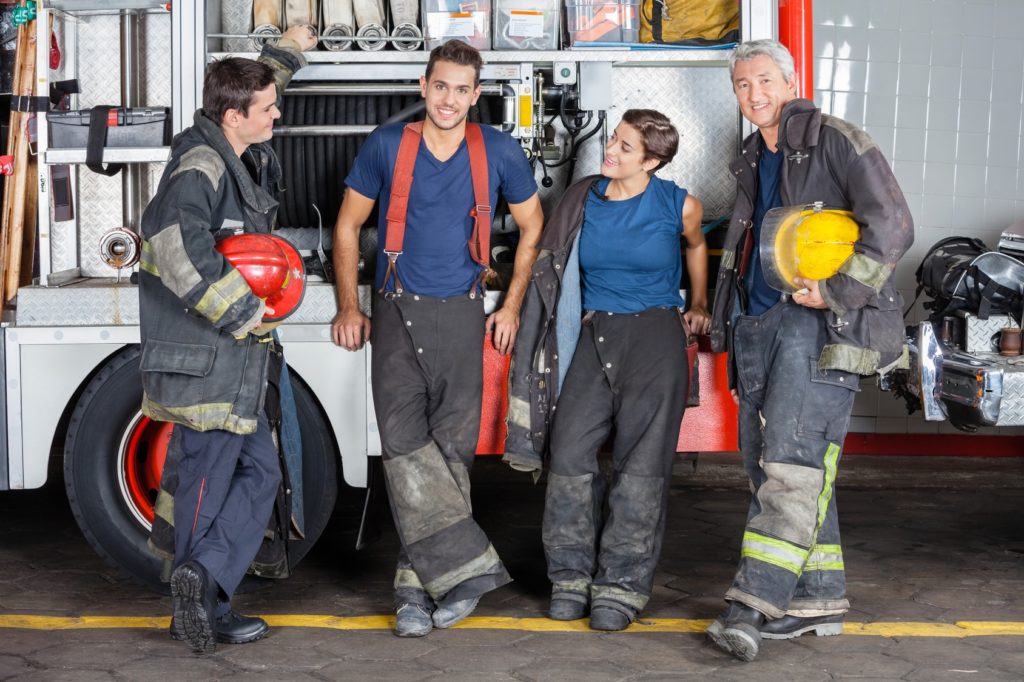
Firefighters: Higher Risk of Venous Insufficiency and Vascular Disease
One might think that the biggest cause of injury among American firefighters would be burns and collapsing structures. However, more than just skin and bones, it is the firefighter’s vascular system that is at risk.
There are a number of reasons why firefighters are especially susceptible to vascular injury, and why they in particular need to consult with a qualified vein specialist for diagnosis and treatment of all dysfunctions that affect the heart and blood vessels, including Chronic Venous Insufficiency (CVI) and varicose veins.
Firefighters are Pushed to the Limit
The schedule of a firefighter is highly unpredictable. Shift work, itself, is disruptive to sleep and eating schedules, and can lead to generalized fatigue and difficult digestion. Unless an individual is motivated, the sometimes long periods of relative inactivity between fire calls can lead to weight gain and decreased levels of fitness; the incidence of overweight and obesity among firefighters is high. And adrenaline-drenched episodes of fire fighting push firefighters to the limit, physically, psychologically and emotionally. Working in the blistering heat, in heavy protective gear, hauling heavy equipment over long distances causes firefighters’ bodies to overheat and dehydrate, their blood vessels to dilate and become less efficient, and their blood more likely to coagulate easily.
Chronic Venous Insufficiency is Common among Firefighters
All of these are factors in the development of cardiovascular disease, including sudden cardiac events. Even more common among firefighters, though, is the development of Chronic Venous Insufficiency. While CVI is not likely to be fatal, it will adversely affect quality of life, and one’s ability to perform firefighting duties. Among other CVI symptoms, sufferers will note that their legs feel heavy, achy, itchy, and tired. Left untreated,Chronic Venous Insufficiency can progress, leading to swelling in the legs, feet and ankles, leg ulcers that don’t heal easily, and Deep Vein Thrombosis (DVT).
The good news is that there is help. If you are experiencing any of the symptoms of CVI, consider consulting a qualified vein specialist as soon as possible.
Using thorough examination techniques and duplex ultrasonography, a qualified vein specialist will be able to assess and recommend a treatment plan tailored to your needs. And there are minimally invasive techniques available that can help optimize your vascular health, with minimal discomfort, and in very little time have you back up and saving the world again, one burning building at a time.
Question: What can a venous reflux exam tell me? How does this treatment measure my veins effectiveness?
Read MoreQuestion: How long does the actual varicose vein surgery itself take and how much time should I expect for the recovery?
Read MorePregunta: ¿Cuáles son las mejores maneras de juzgar las calificaciones de un médico para el tratamiento de las venas? Mis venas están en forma horrible, y me dijeron recientemente que necesitaría 5 procedimientos diferentes de ablación y 6 citas de escleroterapia después. Tuve mi primer procedimiento VNUS por un médico de la vena en Gilbert…
Read MorePregunta: tuve mis inyecciones (escleroterapia) hace 3 semanas (no en el Instituto de vena avanzada de Arizona). Mi tobillo todavía está terriblemente hinchado. He vuelto dos veces para una ecografía y ningún coágulo. ¿Cuánto dura la hinchazón normalmente? Yo camino y no usar mis medias como se indica. Me está disuadiendo de continuar el tratamiento,…
Read MoreQuestion: What are the best ways to judge a doctor’s qualifications for vein treatment? My veins are in horrible shape, and I was recently told that I would need 5 different ablation procedures and 6 Sclerotherapy appointments afterwards. I had my first VNUS procedure by a vein doctor in Gilbert on the greater saphenous vein, and…
Read MoreQuestion: I had my injections (Sclerotherapy) done 3 weeks ago (not at Advanced Vein Institute of Arizona). My ankle is still terribly swollen. I’ve been back twice for an ultrasound and no clot. How long does the swelling normally last? I walk and did wear my stockings as directed. It is deterring me from continuing treatment…
Read MorePregunta: ¿se pueden tratar las venas normales? Así que tengo venas de color verde azulado muy largas en mi muñeca. Sé que hay normalidad pero odio cómo se ven. ¿Puedo tratarlo con escleroterapia? También tengo 2 largas venas verdes en mi pecho. ¡Ayuda! También tengo 15 años, ¿puedo pasar por la escleroterapia?
Read MoreQuestion: Can normal veins be treated? So I have normal very long green bluish color veins in my wrist. I know there normal but I hate how they look. Can I treat it with sclerotherapy? I also have 2 long green veins in my chest. Help! Also I’m 15, can I go through sclerotherapy?
Read MorePregunta: Tengo 50 años de edad; un soltero, y un maestro. En este momento tengo varices (aunque no son dolorosas) en mi pierna derecha. No estoy feliz de verlos. ¿Qué puede sugerir para disminuir su visibilidad?
Read MoreQuestion: What is “extensive vascular calcium deposits” when shown on X-rays?
Read More